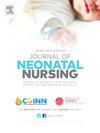空气清新的临终关怀-个案报告
Q2 Nursing
引用次数: 0
摘要
背景卫生保健专业人员(HCPs)在新生儿重症监护病房(NICU)的压力环境中支持姑息治疗是具有挑战性的。获得新鲜空气的空间可以为家庭提供如何管理临终关怀的选择,而在标准操作程序内的协作工作可以支持医护人员感到被授权。一个新生儿,出生时患有一种意想不到的先天性遗传疾病,需要显著的治疗来管理她的诊断,促进花时间与家人在一个新鲜的空气空间。医护人员的协同工作使婴儿能够被转移到组织的重症监护花园,在那里家庭的临终愿望可以得到满足。结果/结果父母对这次经历的反思证明了新鲜空气空间在非临床环境中提供正常和难忘时刻的积极影响。参与的医护人员感到自豪和荣幸,能够满足家庭的愿望,并在当地标准操作程序(SOP)中分享他们的学习,以支持随后转移到重症监护花园。协作工作加强了家庭的选择和机会。安全转移到室外空间是可行的,并在非临床环境中提供个性化护理。准备是关键,风险可以通过与家属讨论和使用SOP来管理。本文章由计算机程序翻译,如有差异,请以英文原文为准。
End of life care in a fresh air space – a case report
Background
It is challenging for health care professionals (HCPs) to support palliative care within the stressful environment of a Neonatal Intensive Care Unit (NICU). Access to a fresh air space can provide families with a choice around how to manage end of life care whilst collaborative working within a standard operating procedure can support HCPs to feel empowered.
Case presentation
A neonate, born with an unexpected congenital genetic disorder, requiring significant therapy to manage her diagnosis was facilitated to spend time with family in a fresh air space. Collaborative working by HCPs enabled the infant to be transferred to the organisations intensive care garden where the families end of life wishes could be fulfilled.
Outcome/results
Parental reflections of the experience demonstrated the positive impact of fresh air space in providing normality and memorable moments in a non-clinical environment. The HCPs involved felt proud and privileged to be able to fulfil the families wishes and shared their learning within a local standard operating procedure (SOP) to support subsequent transfers to the intensive care garden.
Implications
Collaborative working strengthens the choices and opportunities available to families. Safe transfer to outdoor space is feasible and provides personalisation of care in a non-clinical environment. Preparation is key and risk can be manged through discussions with the family and the use of a SOP.
求助全文
通过发布文献求助,成功后即可免费获取论文全文。
去求助
来源期刊

Journal of Neonatal Nursing
Nursing-Pediatrics
CiteScore
2.00
自引率
0.00%
发文量
143
期刊介绍:
Aims & Scope: This is the practical, bimonthly, research-based journal for all professionals concerned with the care of neonates and their families, both in hospital and the community. It aims to support the development of the essential practice, management, education and health promotion skills required by these professionals. The JNN will provide a forum for the exchange of ideas and information between the range of professionals working in this field; promote cooperation between these professionals; facilitate partnership care with families; provide information and informed opinion; promote innovation and change in the care of neonates and their families; and provide an education resource for this important rapidly developing field.
 求助内容:
求助内容: 应助结果提醒方式:
应助结果提醒方式:


